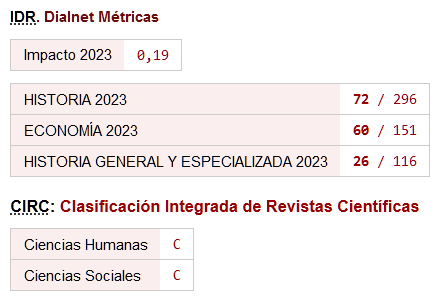The role of accounting. A socio-phenomenological perspective
DOI:
https://doi.org/10.26784/issn.1886-1881.v10i18.71Keywords:
Sociology - phenomenological, Accounting, Memory, FunctionAbstract
This document is an article from reflection, which aims to determine the role of the accounting from the sociology-phenomenological of the Austrian Alfred Schütz; which theorizes about the world of everyday life, explaining that there are three kinds of products: instruments, brands and works of art. From Schütz, the accounting is an instrument and a brand. Instrument because it is useful for... and marks because the man wants to remember. This achievement by making use of the writing and the clay, elements that allowed him to manipulate memory, since it has the ability to recall all human actions. With the sociology-phenomenological, determines that accounting arose by the limited capacity of memory to remember all human actions carried out by the man in the world of everyday life and in reference to his economic zone of operation, area which more than 6000 years ago, in Mesopotamia, had achieved a great development with the accumulation, the conception of property the division of labor and the legal aspects; developments that led to the man to order his actions and to achieve more and better information for the control; aspect that achievement with the accounting. In this order of ideas in the article, it is determined that the accounting did not arise to compensate for the failures of memory, but by the limited capacity of the memory for bringing to the present all human actions, especially those of an economic nature.
Downloads
References
Algarra M. (1993). La comunicación en la vida cotidiana. La fenomenología de Alfred Schütz. Pamplona: Ediciones Universidad de Navarra S.A.
Ariza B., D. (2007). Luces y sombras en el poder constitutivo de la contabilidad ambiental. Revista Investigación y Reflexión, XV (002), pp. 45 - 60. Bogotá: Universidad Militar Nueva Granada.
Arriaga Á., E. G. (2003). La teoría de Niklas Luhmann. Convergencia N° 32, pp. 277 - 312. México, D.F.: UAEM. Anuarios L/L, edición especial, Instituto de Literatura y Lingüística.
Ballesteros, S. (1999). Memoria humana: investigación y teoría. Revista Psicothema Vol. 11, No. 4, pp. 705 - 723. España: Colegio Oficial de Psicólogos del Principado de Asturias.
Basu, S., Kirk, M. y Waymire, G. B. (2009). Memory, transaction records, and the wealth of nations. Accounting, Organizations and Society, Vol. 34, No. 8. Disponible en:
https://doi.org/10.2139/ssrn.1008879
Basu, S. y Waymire, G. B. (2006). Recordkeeping and human evolution. Accounting horizons, Vol. 20, No. 3, pp. 201 - 229. Florida: American Accounting Association.
https://doi.org/10.2308/acch.2006.20.3.201
Bautista, M. y Veiga, C (1998). Los libros de contabilidad: un apunte histórico. Revista Boletín de la Facultad de Derecho No. 13, pp. 395 - 414. España: Universidad Nacional de Educación a Distancia (UNED).
Bautista, P., Martin y Veiga, C. Abel Benito (1998). "Los libros de contabilidad: un apunte histórico", Boletín de la Facultad de Derecho, 13, 395-414
Berger, P. y Luckmann, T. (1983). La construcción social de la realidad. Buenos Aires, Argentina: Editorial Amorrortu, 6a reimpresión de la primera edición en castellano.
Carmona, S. y Ezzamel, M. (2007). Accounting and accountability in ancient civilizations: Mesopotamia and ancient Egypt. Accounting, Auditing & Accountability Journal, Vol. 20, No. 2, pp. 177 - 209. Emerald Group Publishing Limited. https://doi.org/10.1108/09513570710740993
Cañibano, L. y Gonzalo, J. A. (1996). Los programas de investigación en contabilidad. Revista Contaduría No. 29, pp. 13 - 61. Medellín: Universidad de Antioquia.
Crosby, A. (1998). La medida de la realidad. La cuantificación y la sociedad occidental. Primera edición. Barcelona: Crítica Grijalbo Mondadori, S.A.
Del Castillo E., A. y Montiel E., G. (2009). ¿Artefacto o instrumento? Esa es la pregunta. Acta Latinoamericana de Matemática Educativa No. 22, pp. 479 - 488. Comité Latinoamericano de Matemática Educativa A.C. Disponible en: http://www.repositoriodigital.ipn.mx/bitstream/handle/123456789/11380/3%C2%BAPOA%202009%20Gabriela %20Buendia%20%285%29.pdf?sequence=1
Dubet, F. (2010). La sociología de la experiencia. Madrid, España: Editorial Complutense, S.A.
Durkheim, E. (2001). La división del trabajo social. Madrid: Ediciones Akal.
Garfinkel, H. (2006). Estudios en etnometodología. Primera edición. Barcelona: Editorial Anthropos.
Gertz, F. (1999). Origen y evolución de la contabilidad. Ensayo histórico. 5ª edición. México: Trillas.
Goffman, E. (2006). La presentación de la persona en la vida cotidiana. Argentina: Editorial Amorrortu.
Goldberg, L. (1974). Patterns of accounting activities. Australia: University of Melbourne.
Gonçalves, M. y Carvalho L., M. M. (2009). La contabilidad ya estaba presente en la antigüedad clásica. Revista Partida doble No. 215, pp. 34 - 44. España: Ciss Praxis.
Habermas, J. (1981). Teoría de la acción comunicativa. Barcelona: Editorial Taurus.
Hernández E., E. (2005). Reflexiones sobre la naturaleza y los orígenes de la contabilidad por partida doble. Pecvnia No. 1, pp. 93 - 124. León, España: Universidad de León. https://doi.org/10.18002/pec.v0i1.743
Jelin, E. (2001). ¿De qué hablamos cuando hablamos de memorias? Los trabajos de la memoria. Madrid: Siglo XXI Editores. Disponible en: www.cholonautas.edu.pe/modulo/upload/JelinCap2.pdf
Luhmann, N. (1998). Sistemas sociales. Lineamientos para una teoría general. Segunda edición en español. Barcelona: Editorial Antrhopos.
Lythgoe, E. (2000). Pasado y presente en Ricoeur y De Certeau. Algunas consideraciones. Paris: Seuil.
Mattessich, R. (1998). Recent insights into mesopotamian accounting of the 3rd Millenium B.C. - Successor to token accounting. The Accounting Historians Journal, Vol. 25, No. 1, pp. 1 - 27. University of Mississippi. MedlinePlus. Servicio de la Biblioteca Nacional de Medicina de EE.UU. Disponible en: www.nlm.nih.gov/medlineplus/spanish/ency/article/003257.htm Consultado 23/06/2012. https://doi.org/10.2308/0148-4184.25.1.1
Méndez P. y Ribeiro, D. (2012). Aspectos históricos del pensamiento contable: de los inicios al paradigma de la utilidad. Nuevas corrientes del pensamiento económico. Revista Información Comercial Española (ICE), No. 865, pp. 71 - 78. Madrid: Ministerio de Economía y Competitividad. Disponible en: http://www.revistasice.com/CachePDF/ICE_865___9281FE1E70B25A33DF5B2F90934FD7F5.pdf
Merton, R. (1964). Teoría y estructura sociales. México: Fondo de Cultura Económica.
North, D. C. (1991). Institutions, institutional change and economic performance. Series Political Economy of Institutions and Decisions. Cambridge University Press.
Parsons, T. (1967). Sociological Theory and Modern Society. California: Free Press University.
Radcliffe-Brown, A. R. (1986). Estructura y función en la sociedad primitiva. Barcelona: Editorial Planeta De-Agostini, S. A.
Ricoeur, P. (2004). La memoria, la historia y el olvido. Buenos Aires: Fondo de Cultura Económica.
Rojas R., W. (2003). Modernidad & Inhumanidad: Lo inhumano en la organización y en el trabajo. Primera edición. Cali: Programa Editorial Facultad de Ciencias de la Administración, Universidad del Valle.
Schütz, A. (2008). El problema de la realidad social. Escritos I. Segunda edición en castellano. Buenos Aires: Amorrortu Editores.
Schütz, A. y Luckmann, T. (2003). Las estructuras del mundo de la vida. Primera edición en castellano. Buenos Aires: Amorrortu Editores.
Schütz, A. (1993). La construcción significativa del mundo social. Una introducción a la sociología comprensiva. Primera reimpresión. Barcelona: Editorial Paidós.
Searle, J. R. (1997). La construcción de la realidad social. Barcelona: Ediciones Paidós Ibérica.
Sei, M. (2004). Técnica, memoria e individuación: la perspectiva de Bernard Stiegler. LOGOS, Anales del Seminario de Metafísica No. 37, pp. 337 - 363. Madrid: Universidad Complutense.
Túa P., J. (1995). Evolución del concepto de contabilidad a través de sus definiciones. En: Lecturas de teoría e investigación contable. Recopilación de artículos del autor, pp. 121 - 88. Medellín: Centro Interamericano Jurídico-Financiero.
Downloads
Published
How to Cite
Issue
Section
License

This work is licensed under a Creative Commons Attribution-NonCommercial-ShareAlike 4.0 International License.










